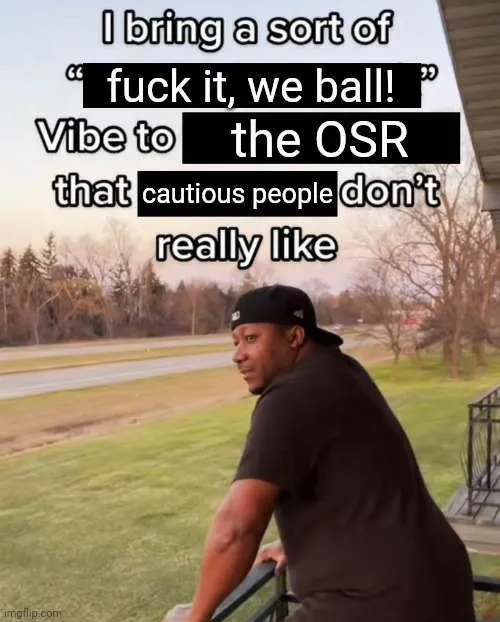How to make OSR play unfun
Ram has been making a bunch of fun microposts lately, in an attempt to normalize the practice, which I love! That's about the scope of this idea and my ability right now anyway, so here goes.
How to make OSR unfun
1. Danger and death
Serket has been pretty consistently confused by and making valiant attempts to understand why people enjoy OSR play. One of the biggest sticking points seems to be character death and the telegraphing of danger. She wonders:
Why she should invest herself in a character's motivations and persona if life is so cheap.
An example that came up from myself was the death of an Elf character in an OSE game I ran years ago. The party had just come ashore of an island on a ships boat and I rolled a random encounter of Sahaugin. They surprised the party and a lucky roll of a thrown javelin brought down Samara in 1 shot despite her full plate and 4HP. This death was fine within the rules and procedures, but it wasn't fun. There was absolutely no decision on the player's part, she had no agency. There were a number of other PC deaths in that campaign, but that one was a mistake on my part, one of my biggest regrets running for that group. Life may be cheap in an OSR game, but player agency is of paramount importance in any RPG. Danger should be assayed with informed consent. See ICI doctrine and this quote from The Electric Bastionland essay Informed Danger and Death:
When players die, they should look back and see where they went wrong. If they can’t do that, they probably didn’t have enough information.
Conclusion: Just listen to Chris McDowall. Or more immediately, make sure your players have all the information they need in order to have a fun death.
2. Decisions
Another of Serket's sticking points:
If there are a number of options presented (for instance, what direction to go in a hexcrawl) and each option carries a significant risk why decide at all? Why wouldn't the character's just go home?
The answer here has more to do with the player than the Referee and it's simple: "Because that's the game we're playing tonight." Some people prefer tea to coffee, some people take their coffee black or with milk and cream. I would never tell Serket she's wrong for not preferring OSR games, that's a matter of taste. However, if you're playing an OSR game it will be more fun if you approach it on it's own terms. I like the axiom "the game is what happens at the table." I don't want to be invested in a character I'm playing until they've earned it, and plenty never will because they'll be dead, and that's fun for me. I love coming up with a zany plan and seeing what happens, and sometimes what happens is horrible which I also love. String together enough successes, and enough motivations, and friends/enemies made and you get a character worth being invested in. Then if that character dies it's still fun because they got to live a full life (as grubby and full of horror as it may be). To get to the point, OSR games aren't fun unless you're actually making decisions, even if it's just the least worst decision. Another example: in a recent session of Dododecahedron's FANTASTIC Castle Kelpsprot game our group was deciding how to approach some mind controlling jellyfish thralls. We had access to a secret door into their base and I was cautioning against using it because what if by using it we lost the use of it. Luckily noted exploration procedure hater Liz of Magnolia Keep was also playing, and she is wise. "Why would we not do the thing when we're here to do the thing?!?" I, and I suspect a lot of OSR players have the tendency to be too conservative. We're here to play the game, so lets make the best plan we can and execute the fucker to the best of our ability.
Conclusion: This isn't Wargames. The only way to lose the game is not to play.

Addendum: PaulJ makes this point on discord
I'll add one more reason death can be fun. A character death is good if it uncovers useful information for the rest of the party. This is like how classic roguelikes work. You'll die a lot, but you uncover information the more you play, which improves your overall chances of thriving in the hostile environment. And that means of progress can be satisfying for a certain type of person (myself for instance).
This is contingent on a certain type of adventure design. Information has to be of greater overall utility than character levels, otherwise it feels like a bad trade.